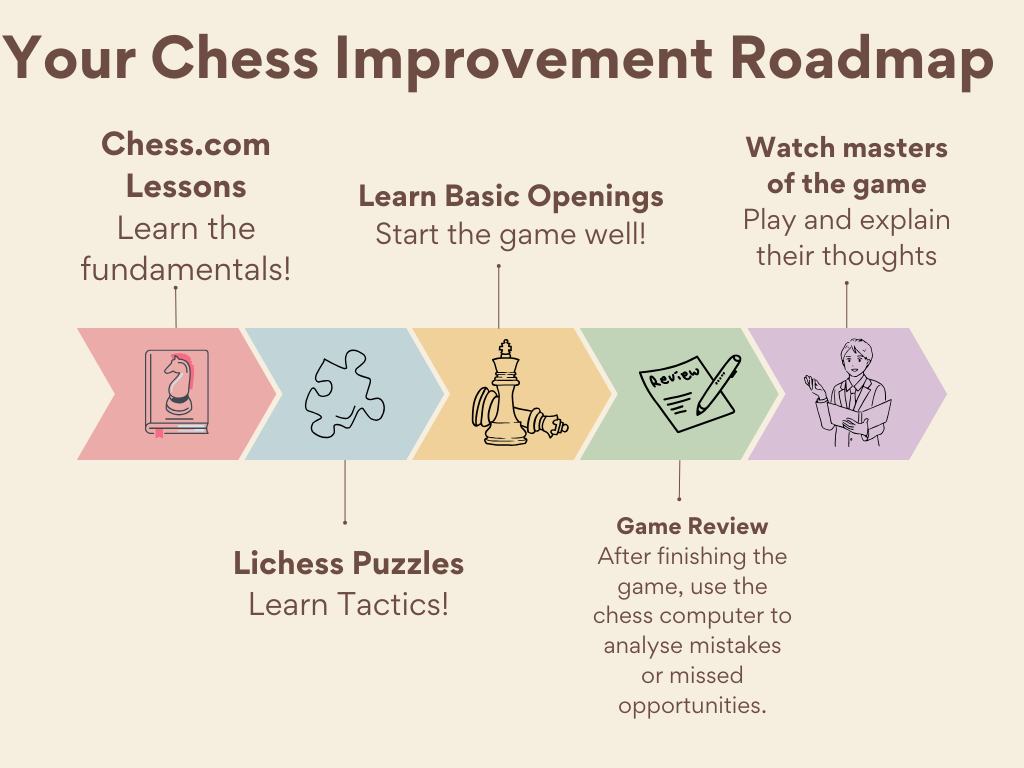
Beginner Roadmap 100-1500 rating.
Step 1: Chess.com Lessons
My first recommendation for a beginner is always the
Take advantage of their free trial of Diamond membership. It really is the gold standard resource.
Use these lessons to:
Learn basic Strategy: Things like Control the Centre, Develop your pieces effectively, Castle early, Keep your pieces protected & Leave the queen at home.
Learn basic Checkmates: Checkmate in 1 puzzles, Checkmate in 2 puzzles, Back rank checkmate, How to checkmate King/Queen vs King and 2 Rooks vs King.
Learn basic Tactics: Forks(double attacks), Pins, Skewers, Discovered attacks, Discovered checks.
Step 2: Lichess Puzzles
Once you’ve learned the above, test your skills on:
This will teach you to analyse a position and use tactics to win material or checkmate. Aim to do 3 puzzles per day and solve them before moving the pieces.
Step 3: Learn Basic Openings
Once you’ve done some puzzles…
Learn your chess openings:
A good chess opening is built on the basic principles: control the center, keep your king safe, and develop your knights and bishops effectively.
Sticking with a specific opening can make each game feel more familiar, allowing you to build on your knowledge step by step.
And remember—since there are more possible chess games than atoms in the universe, it’s best to focus on mastering just a few!
Learn a white opening… perhaps:
1.E4: Aiming for the Italian opening.
Or
1.D4: Aiming for a London System (simple) or the Queen’s Gambit (ambitious).
Learn two black defences.. perhaps:
Vs E4: 1.. E5 the classical kings pawn defence.
And
Vs D4: 1..D5 aiming for a Queens Gambit Declined.
It’s important to experiment with different openings to find out what fits your style best. Do you enjoy closed positions with locked pawns in the center, where careful maneuvering decides the game? Or do you prefer sharp, tactical openings with open lines and direct attacks on the king?
Chessable is a great resource to learn openings.
Step 4: Game Review
It’s key to review every single game you play! Use a chess computer to see what you did well and what you need to improve on!
Chess.com: Game Review – Chess Terms – Chess.com
Lichess: Open your game on analysis board and request a computer analysis -> then use the Learn from your mistakes function.
The chess computer evaluation numbers for white indicate:
+0.0 -> +0.9 = A balanced game or slight advantage white.
+1.0 = White is up at-least a pawns worth of material and should win the game most of the time.
+3.0 = White is up a minor piece a bishop or knight and should win the game with best play every single time.
Step 5: Watch Masters of the Game
Watching masters play and explain their games are so beneficial to coming up with plans. Watch them control the centre, have safe kings and take advantage of opponents mistakes!
Bonus Tip: How often should I play vs study?
Play 1-3 games per day (no more) and ensure to analyse each game.
Solve 1-3 puzzles per day also, ensuring you solve the puzzle before moving.
What time control: 15+10 is best. 10+0 is the fastest I would go.
Focus on controlling the centre and having a safe king above all.
Intermediate/Advanced Study 1200-2000
Step 1: Learn Positional Play
Positional play is about creating small, long term advantages. If you have enough of these, your opponent will eventually lose material or the game.
Chess is won by identifying imbalances…deciding which is most important, and exploiting it.
As Jeremy Silman put it in his book, these imbalances could be:
Superior Minor Piece, Pawn Structure, Space, Material, Control of a Key File, Control of a Hole or Weak Square, Development, and the Initiative.
Learn to identify these things, and you will win more games.
Step 2: Deep Dive into your openings
Its probably time to bite the bullet and buy a Chessable course. Masters give you lines to play against everything, to win the most games it’s important to have a consistent repertoire so you get comfortable positions you know well out of the opening.
Step 3: Learn Calculation
Learning to evaluate a position and calculate candidate moves quickly and accurately is the key to avoiding blunders and create positional or tactical advantages in the middle/end game.
Learning to calculate short to long lines in your head is the key to winning chess games at a high level.
Chess Book Recommendations
Play Winning Chess by Yasser Seirawan (Beginner Strategy)
Winning Chess Tactics by Yasser Seirawan (Beginner Tactics)
Online Course Recommendations:
Fundamental Chess Calculation Skills by CM Can Kabadayi (Intermediate Calculation)
